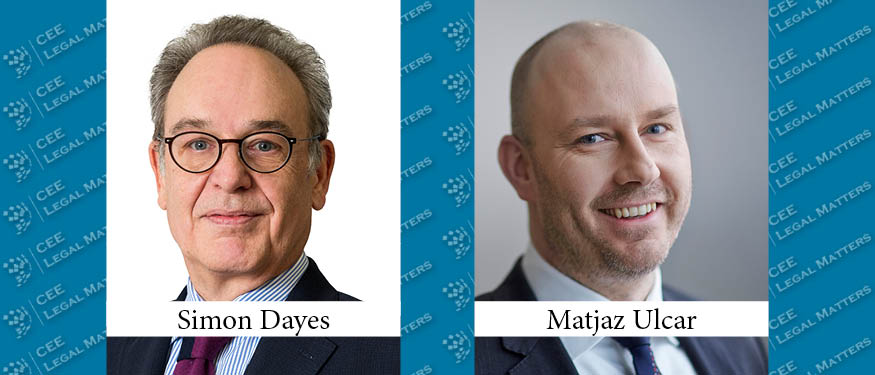CEELM: First, congratulations on winning the DOTY! Tell us a bit about the deal and your firm’s role in getting it across the finish line.
Ulcar: For the project financing of the Krivaca wind plant, our team was legal advisor to the borrower (Ivicom Energy) and sponsors – Alfi Green Energy Fund (Slovenia) and MK Group (Serbia). Our primary responsibility was to negotiate and settle all financing agreements, including the facility agreement, security documents, and a large volume of other finance-related paperwork. In addition, we coordinated the work of legal advisors to the borrower in other jurisdictions and provided support in relation to electricity off-take arrangements.
Dayes: Dentons advised Erste Bank (Vienna) as lead arranger for the finance, and a group of seven specialist bank lenders from Vienna, Belgrade, and Ljubljana. Most also took on additional roles, perhaps most importantly three banks supported the borrower’s payment obligations to the electricity off-taker Axpo, through a network of guarantees.
A key feature is that this is Serbia’s first “merchant” transaction – the electricity price is that determined by whatever the electricity market is paying. The risk of falling prices is hedged with a financial derivative – Axpo tops up with additional payments if the market price of electricity falls below a certain benchmark. In this way, both sponsors and lenders can be sure of a minimum income level that will drive the financial model.
CEELM: What do you believe it was about your firm/team that won you the mandate?
Dayes: We know the Erste Bank renewable energy team from previous transactions, including three in Serbia. While this mandate was won through a competitive tender, Matjaz was also kind enough to recommend Dentons based on experiences working with our partners in CEE on other financing and M&A transactions.
Ulcar: We benefit from a strong and lasting relationship with the management team of Alfi Renewables (the fund manager) over many years. We have worked with them in other roles in the past and have a proven track record of trusted advice and support in similar transactions in Central Europe.
CEELM: What do you believe were the main considerations for which the jurors picked this deal as the winner?
Dayes: I would say two things: first, the structure of the electricity off-take arrangements, which are brand new and pioneering but which potentially have wide application across Central Europe (and we have seen subsequent deals which are taking up the challenge). Second, the general complexity of the contractual framework – so many different interests needed to be reconciled, across a number of legal jurisdictions including Serbia, Slovenia, Cyprus, Germany, Switzerland, Bosnia, Austria, and beyond. A large group of people worked around the clock to achieve this, not just lawyers but specialists and advisors from many different disciplines.
Ulcar: This was Serbia’s first merchant project, the first to successfully secure financing without any form of state subsidy. Additionally, we ended up creating over forty finance documents (excluding the commercial project documents) involving multiple parties and multiple governing laws, which shows the complexity of the financing deal itself. The total amount financed, over EUR 150 million, is also significant for deals in this context.
CEELM: What were the most complex aspects of the deal from a legal perspective? And what were some of the biggest difficulties faced in the process?
Ulcar: The most challenging aspect was aligning all the timelines, especially due to the off-take arrangements. Project management needed to be flawless, a delicate operation where timing can be dependent on market forces. Additionally, the banks needed industry specialists to review and sign off on project timelines and underlying assumptions without any delay. Three-party and direct agreements involving suppliers and lenders, although standard practice, posed major challenges given the varying interests and different regions involved.
Dayes: New structures can be challenging, particularly when participators are faced with new documents that have no market precedent. But we benefited from some great thinking and expertise from sponsors and lenders – potentially thorny issues, particularly intricate inter-creditor arrangements and, Serbia’s foreign exchange regulations, were ultimately resolved comfortably for all.
CEELM: In contrast, what, in your opinion, went particularly smoothly and what do you believe contributed to it?
Ulcar: Despite the complexity, the deal was negotiated in a reasonably short time, and we were able to get over the inevitable unexpected challenges. Our main task was to ensure that we could meet the deadlines, and this was done notwithstanding the strong commercial positions you would expect parties of this caliber to take. The volatility of market prices, beyond anyone’s control, needed careful monitoring but, nonetheless, the Dentons team was extremely accommodating and readily available to discuss and try to come to solutions acceptable to us.
Dayes: We are particularly grateful to Matjaz and the sponsors’ legal teams for their understanding of lenders’ concerns and typical market positions, and for their willingness to spend time with us identifying and settling potential fixes. Also, the project benefited greatly from their deft handling of negotiations with third-party project suppliers and counterparties – this is a key skill of sponsors’ counsel which (in my view at least) could and should be more widely recognized in CEE project finance.
CEELM: In your view, what is the significance of this deal for the Serbian market and the wider CEE region?
Dayes: This transaction could be a good blueprint for bankable merchant renewables financings across the region (or anywhere!). We think that it distributes risk fairly and logically between sponsors, lenders, suppliers, and other stakeholders. Although there are some complex issues and documents for participators to get their arms around, I think it can – and hope it will – prove successful!
Ulcar: Fully agree with Simon. This transaction is a good example that it is possible to structure and develop a sizeable (more than 100-megawatt) renewables project without any kind of state subsidizing, and, to achieve the ambitious goal of green transition, we believe the blueprint will be used for other projects as well.
This article was originally published in Issue 10.5 of the CEE Legal Matters Magazine. If you would like to receive a hard copy of the magazine, you can subscribe here.


